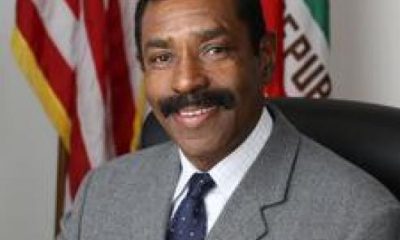Business
Lew Says Congress Should Turn Efforts Toward Business Taxes

In this Feb. 13, 2013, file photo, Jack Lew testifies at his confirmation hearing to be the new Treasury Secretary in Washington. (AP Photo/J. Scott Applewhite)
STEPHEN OHLEMACHER, Associated Press
WASHINGTON (AP) — The Obama administration is pushing Congress to simplify federal business taxes after Treasury Secretary Jacob Lew said Democrats and Republicans are too far apart to agree on sweeping changes to taxes paid by individuals and families.
Lew said the Obama administration has no interest in lowering the top income tax rate paid by individuals, a key goal for Republicans. He said there are more areas of agreement on business taxes.
“I don’t think that there’s any advantage in pretending that there aren’t big disagreements on the individual tax side,” Lew said at a forum hosted by the Brookings Institution, a Washington think tank. “We had a national debate just two years ago about the top rate. We’re not looking at the kind of negotiation to go back to lower the top rate.”
“While our views on individual tax reform may be far apart,” Lew added, “there is a broad set of business tax reforms on which we should be able to agree.”
Lew’s comments came after President Barack Obama proposed raising taxes on the rich and using some of the revenue to finance tax breaks for the middle class. In his State of the Union address this week, Obama called his approach “middle-class economics.”
Congressional Republicans panned the speech, saying there is no way they would use their majorities in the House and Senate to enact tax increases.
“This White House is more about redistribution and populist class warfare than about actual bipartisan tax reform,” said Sen. Orrin Hatch, R-Utah, chairman of the Senate Finance Committee.
Congressional Republicans said they were disappointed the Obama administration isn’t pushing to simplify taxes for individuals. They noted that the vast majority of small business owners report business income on their individual tax returns.
Still, key Republicans said they would welcome more talks about business taxes.
“We’re going to keep talking. We’re going to exhaust the possibilities of seeing where the common ground exists and see if we can get something done,” said Rep. Paul Ryan, R-Wis., chairman of the tax-writing House Ways and Means Committee.
“We do have big differences of opinion and our next step is to explore the areas of common ground if and where they exist,” Ryan said. “I’d like comprehensive tax reform and I think it’s important that you make sure that small businesses don’t fall by the wayside. And that is very important to us, and so we’ll see if we can complete the circle.”
Hatch and Sen. Ron Wyden of Oregon, the top Democrat on the Finance Committee, have formed five bipartisan working groups to work on various aspects of the tax code, with the goal of developing comprehensive legislation by the end of the year.
“I don’t want to just release a framework or a proposal that doesn’t go anywhere,” Hatch said in a speech this week. “My only goal when it comes to tax reform is to make new law.”
Democrats and Republicans alike agree that the nation’s tax laws are too complicated for businesses and individuals, filled with too many exemptions, deductions and credits. The tax code is so complex that most Americans pay someone to do their taxes or they buy commercial software to help them file.
There is also widespread agreement that lawmakers should eliminate some targeted tax breaks and use the extra revenue to lower tax rates for everyone. However, there is no consensus on which tax breaks should go and whose tax rates should be cut.
The top federal income tax rate for individuals and families is 39.6 percent. Some Republicans in Congress would like to lower it to 25 percent.
“I don’t think lowering the top individual rate is the way to grow our economy or create a better future for middle-class workers or for the country at large,” Lew said.
Obama released a framework for business tax reform in 2012. In it, he called for lowering the top corporate income tax rate from 35 percent — the highest in the industrialized world — to 28 percent. Obama would finance the cut by eliminating dozens of targeted tax breaks for corporations.
The corporate income tax, however, only affects a small percentage of American businesses. More than 30 million tax returns a year report business income. But in 2013, only 2.2 million were traditional corporations that paid the corporate income tax.
The overwhelming majority were sole proprietorships, partnerships and other corporations in which the owners report their business income on their individual tax returns. These businesses, known as pass-throughs, would not benefit from a cut in the corporate income tax rate.
Lew said Obama’s plan would help these businesses in other ways, such as easing accounting rules and enabling them to more quickly write off business expenses.
Key Republicans in Congress, however, are skeptical that Obama’s proposals would do enough to help small businesses.
“Let’s start the discussion on businesses, but it’s difficult to follow that all the way through without having a real adult conversation about individual rates because so many of our businesses are filing over there,” said Rep Kevin Brady of Texas, a senior Republican on the Ways and Means Committee.
___
Follow Stephen Ohlemacher on Twitter: http://twitter.com/stephenatap
Copyright 2015 The Associated Press. All rights reserved. This material may not be published, broadcast, rewritten or redistributed.
Bay Area
State Controller Malia Cohen Keynote Speaker at S.F. Wealth Conference
California State Controller Malia Cohen delivered the keynote speech to over 50 business women at the Black Wealth Brunch held on March 28 at the War Memorial and Performing Arts Center at 301 Van Ness Ave. in San Francisco. The Enterprising Women Networking SF Chapter of the American Business Women’s Association (ABWA) hosted the Green Room event to launch its platform designed to close the racial wealth gap in Black and Brown communities.

By Carla Thomas
California State Controller Malia Cohen delivered the keynote speech to over 50 business women at the Black Wealth Brunch held on March 28 at the War Memorial and Performing Arts Center at 301 Van Ness Ave. in San Francisco.
The Enterprising Women Networking SF Chapter of the American Business Women’s Association (ABWA) hosted the Green Room event to launch its platform designed to close the racial wealth gap in Black and Brown communities.
“Our goal is to educate Black and Brown families in the masses about financial wellness, wealth building, and how to protect and preserve wealth,” said ABWA San Francisco Chapter President LaRonda Smith.
ABWA’s mission is to bring together businesswomen of diverse occupations and provide opportunities for them to help themselves and others grow personally and professionally through leadership, education, networking support, and national recognition.
“This day is about recognizing influential women, hearing from an accomplished woman as our keynote speaker and allowing women to come together as powerful people,” said ABWA SF Chapter Vice President Velma Landers.
More than 60 attendees dined on the culinary delights of Chef Sharon Lee of The Spot catering, which included a full soul food brunch of skewered shrimp, chicken, blackened salmon, and mac and cheese.
Cohen discussed the many economic disparities women and people of color face. From pay equity to financial literacy, Cohen shared not only statistics, but was excited about a new solution in motion which entailed partnering with Californians for Financial Education.
“I want everyone to reach their full potential,” she said. “Just a few weeks ago in Sacramento, I partnered with an organization, Californians for Financial Education.
“We gathered 990 signatures and submitted it to the [California] Secretary of State to get an initiative on the ballot that guarantees personal finance courses for every public school kid in the state of California.
“Every California student deserves an equal opportunity to learn about filing taxes, interest rates, budgets, and understanding the impact of credit scores. The way we begin to do that is to teach it,” Cohen said.
By equipping students with information, Cohen hopes to close the financial wealth gap, and give everyone an opportunity to reach their full financial potential. “They have to first be equipped with the information and education is the key. Then all we need are opportunities to step into spaces and places of power.”
Cohen went on to share that in her own upbringing, she was not guided on financial principles that could jump start her finances. “Communities of color don’t have the same information and I don’t know about you, but I did not grow up listening to my parents discussing their assets, their investments, and diversifying their portfolio. This is the kind of nomenclature and language we are trying to introduce to our future generations so we can pivot from a life of poverty so we can pivot away and never return to poverty.”
Cohen urged audience members to pass the initiative on the November 2024 ballot.
“When we come together as women, uplift women, and support women, we all win. By networking and learning together, we can continue to build generational wealth,” said Landers. “Passing a powerful initiative will ensure the next generation of California students will be empowered to make more informed financial decisions, decisions that will last them a lifetime.”
Business
Black Business Summit Focuses on Equity, Access and Data
The California African American Chamber of Commerce hosted its second annual “State of the California African American Economy Summit,” with the aim of bolstering Black economic influence through education and fellowship. Held Jan. 24 to Jan. 25 at the Westin Los Angeles Airport Hotel, the convention brought together some of the most influential Black business leaders, policy makers and economic thinkers in the state. The discussions focused on a wide range of economic topics pertinent to California’s African American business community, including policy, government contracts, and equity, and more.

By Solomon O. Smith, California Black Media
The California African American Chamber of Commerce hosted its second annual “State of the California African American Economy Summit,” with the aim of bolstering Black economic influence through education and fellowship.
Held Jan. 24 to Jan. 25 at the Westin Los Angeles Airport Hotel, the convention brought together some of the most influential Black business leaders, policy makers and economic thinkers in the state. The discussions focused on a wide range of economic topics pertinent to California’s African American business community, including policy, government contracts, and equity, and more.
Toks Omishakin, Secretary of the California State Transportation Agency (CALSTA) was a guest at the event. He told attendees about his department’s efforts to increase access for Black business owners.
“One thing I’m taking away from this for sure is we’re going to have to do a better job of connecting through your chambers of all these opportunities of billions of dollars that are coming down the pike. I’m honestly disappointed that people don’t know, so we’ll do better,” said Omishakin.
Lueathel Seawood, the president of the African American Chamber of Commerce of San Joaquin County, expressed frustration with obtaining federal contracts for small businesses, and completing the process. She observed that once a small business was certified as DBE, a Disadvantaged Business Enterprises, there was little help getting to the next step.
Omishakin admitted there is more work to be done to help them complete the process and include them in upcoming projects. However, the high-speed rail system expansion by the California High-Speed Rail Authority has set a goal of 30% participation from small businesses — only 10 percent is set aside for DBE.
The importance of Diversity, Equity and Inclusion (DEI) in economics was reinforced during the “State of the California Economy” talk led by author and economist Julianne Malveaux, and Anthony Asadullah Samad, Executive Director of the Mervyn Dymally African American Political and Economic Institute (MDAAPEI) at California State University, Dominguez Hills.
Assaults on DEI disproportionately affect women of color and Black women, according to Malveaux. When asked what role the loss of DEI might serve in economics, she suggested a more sinister purpose.
“The genesis of all this is anti-blackness. So, your question about how this fits into the economy is economic exclusion, that essentially has been promoted as public policy,” said Malveaux.
The most anticipated speaker at the event was Janice Bryant Howroyd known affectionately to her peers as “JBH.” She is one of the first Black women to run and own a multi-billion-dollar company. Her company ActOne Group, is one of the largest, and most recognized, hiring, staffing and human resources firms in the world. She is the author of “Acting Up” and has a profile on Forbes.
Chairman of the board of directors of the California African American Chamber of Commerce, Timothy Alan Simon, a lawyer and the first Black Appointments Secretary in the Office of the Governor of California, moderated. They discussed the state of Black entrepreneurship in the country and Howroyd gave advice to other business owners.
“We look to inspire and educate,” said Howroyd. “Inspiration is great but when I’ve got people’s attention, I want to teach them something.”
Activism
Oakland Post: Week of April 17 – 23, 2024
The printed Weekly Edition of the Oakland Post: Week of April 17 – 23, 2024

To enlarge your view of this issue, use the slider, magnifying glass icon or full page icon in the lower right corner of the browser window. ![]()
-

 Activism4 weeks ago
Activism4 weeks agoOakland Post: Week of March 27 – April 2, 2024
-

 #NNPA BlackPress4 weeks ago
#NNPA BlackPress4 weeks agoCOMMENTARY: D.C. Crime Bill Fails to Address Root Causes of Violence and Incarceration
-

 #NNPA BlackPress4 weeks ago
#NNPA BlackPress4 weeks agoFrom Raids to Revelations: The Dark Turn in Sean ‘Diddy’ Combs’ Saga
-

 #NNPA BlackPress4 weeks ago
#NNPA BlackPress4 weeks agoCOMMENTARY: Lady Day and The Lights!
-

 #NNPA BlackPress4 weeks ago
#NNPA BlackPress4 weeks agoMayor, City Council President React to May 31 Closing of Birmingham-Southern College
-

 #NNPA BlackPress4 weeks ago
#NNPA BlackPress4 weeks agoBaltimore Key Bridge Catastrophe: A City’s Heartbreak and a Nation’s Alarm
-

 #NNPA BlackPress4 weeks ago
#NNPA BlackPress4 weeks agoBaltimore’s Key Bridge Struck by Ship, Collapses into Water
-

 #NNPA BlackPress4 weeks ago
#NNPA BlackPress4 weeks agoBeloved Actor and Activist Louis Cameron Gossett Jr. Dies at 87





















































